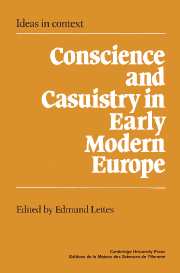Book contents
- Frontmatter
- Contents
- Notes on contributors
- Introduction
- 1 Governing conduct
- 2 Laxity and liberty in seventeenth-century English political thought
- 3 Casuistry and character
- 4 Prescription and reality
- 5 The ‘new art of lying’: equivocation, mental reservation, and casuistry
- 6 Kant and casuistry
- 7 Moral arithmetic: Seven Sins into Ten Commandments
- 8 Optics and sceptics: the philosophical foundations of Hobbes's political thought
- Index
4 - Prescription and reality
Published online by Cambridge University Press: 13 October 2009
- Frontmatter
- Contents
- Notes on contributors
- Introduction
- 1 Governing conduct
- 2 Laxity and liberty in seventeenth-century English political thought
- 3 Casuistry and character
- 4 Prescription and reality
- 5 The ‘new art of lying’: equivocation, mental reservation, and casuistry
- 6 Kant and casuistry
- 7 Moral arithmetic: Seven Sins into Ten Commandments
- 8 Optics and sceptics: the philosophical foundations of Hobbes's political thought
- Index
Summary
THE SOCIOLOGY AND HISTORY OF MENTAL OUTLOOK
For a long time sociologists and historians were prevented by a kind of reticence from studying the religion of ‘ordinary people’ both in the past and in their own time, and it was not until 1931 that Gabriel Le Bras took a lead from Durkheim, Hubert, and Mauss, and became the first French historian to reverse this trend. He encouraged his readers to consider Christianity from below, as it affected the anonymous mass of the people, rather than at the level of doctrine and those who formulated it, and this opened the way to a great variety of research in the sociology of religion while, at the same time, providing a new impetus for the historiography of religion, for it became clear that much more needed to be known about the faith, the practice of Christianity, and the morals of the billion Frenchmen who preceded us. Lucien Febvre was reaching similar methodological conclusions at approximately the same time. In 1932 he wrote,
It is almost unbelievable that we know so little about the basic elements, the most important and widespread religious practices, and so many of the great pilgrimages themselves. All we have are brief mentions scattered among inaccessible articles and journals, and too often even those are there for non-historical reasons.
These calls for a new intellectual approach have found a receptive audience, especially in recent years, and a mass of new research followed their pioneering work.
- Type
- Chapter
- Information
- Conscience and Casuistry in Early Modern Europe , pp. 134 - 158Publisher: Cambridge University PressPrint publication year: 1988
- 4
- Cited by



